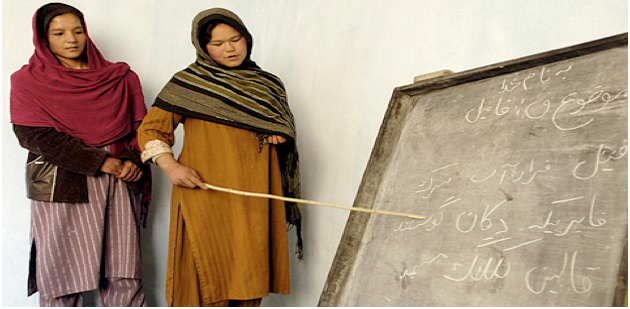GUEST WORDS-Although some female poets in Afghanistan have been killed by their male family members for penning poetry, many see it as an outlet to express their inner and outer worlds during a time of great national turmoil. Several organizations have formed to collect their work anonymously to keep them from danger, as well as teach several to read since 88 percent of Afghan women are illiterate.
The literary society Mirman Baheer operates covertly, allowing poets to meet in person and recite their work on a radio program created in conjunction with the Afghan Women’s Writing Project. AWWP was founded four years ago to promote poetry written by women, taking care to omit any information that could lead to their identification, as well as run creative writing workshops in various parts of the war-torn country.
Many female Afghan poets choose to write two-line poems called landays. These often rage-filled verses stem from a tradition of women who would recite them when gathered together. The news organization Dowser Media discusses how this age-old form is being used in modern day Afghanistan:
The tradition of landays provides some level of anonymity for women because they are collective. They are recited and shared rather than attributed to a single poet…They can explore rage, sarcasm, irony, loss, separation and desire. Many of the poems are humorous, filled with bawdy sexual imagery.
Whatever the subject, a landay lilts from word to word in a short lullaby with scathing, layered meaning. These poems come from a long legacy of Afghan women’s literature.
“The Afghan woman poet predates the American or European female poet,” says Zohra Saed, an Afghan-American poet living in New York City. “Consider the poet queen Rabia Balkhi.” Legend has it this 11th century Afghan used her last drop of blood to write poems.
“Afghan women’s poetry is unique because it must respond to create change,” says Saed. “Within our communities and also to change outside perceptions. It is the poetry of witness, of trauma, of memory and of struggle to be seen as individuals.”
Today, Afghan literature is fragmented by linguistic, cultural and geographic divides. Some of the world’s most prominent Afghan writers live outside their fatherland and write in English. Many female writers in Afghanistan come from the urban elite, often educated in western universities. Poems by women in rural Afghanistan are rarely published. Groups like the Afghan Women’s Writing Project and the Poetry Foundation are working to bridge this divide.
And while organizations try their best to disseminate these women’s powerful poems, the dangers they face for their art are relentless. Just this year, a member of Mirman Baheer was abused by her brothers for writing poetry and chose self-immolation as a protest to their brutality. Here’s a landay she used to recite:
“You sold me to an old man, Father.
May God destroy your home, I was your daughter.”
(Natasha Hakimi posts at TruthDig. This column was posted first at TruthDig.com … an important online publication edited by Robert Scheer and featuring such writers as Bill Boyarsky, Chris Hedges, Richard Reeves, Amy Goodman and others.)
-cw
CityWatch
Vol 11 Issue 78
Pub: Sept 27, 2013





